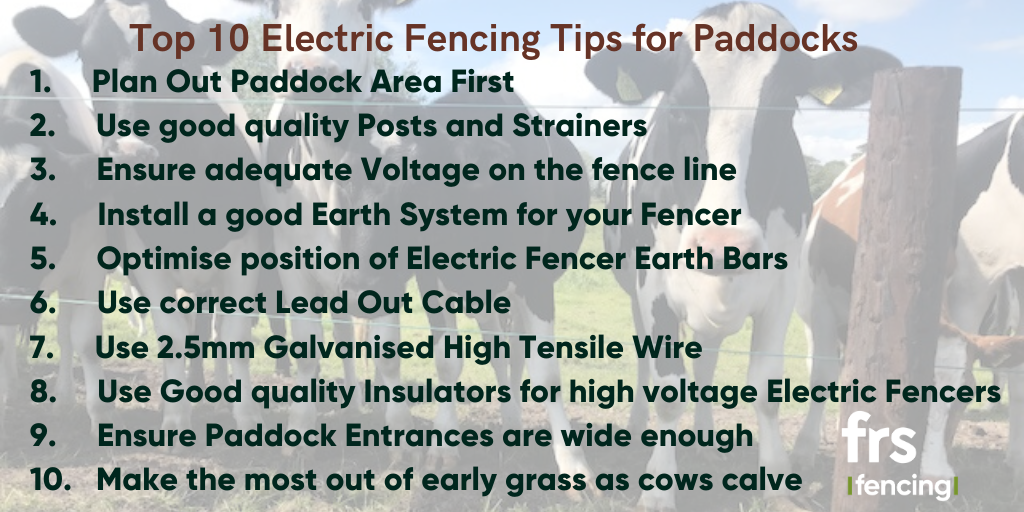1 Plan Paddock Area First:
- Consider the size, shape and number of paddocks.
- Positioning and width of roadways.
- Position of water troughs.
2. Use good quality Posts and Strainers:
- FRS recommends Long life creosote treated posts and strainers.
3. Ensure adequate Voltage on the fence line:
- Pick an electric fence unit capable of giving enough of a “shock” taking into consideration the length of wire being powered.
- The minimum volts for Dairy Cows is 2,000 volts, Cattle is 3,000 volts and Sheep is 4,000 volts.
- Most electric fences give out 5,000 to 8,000 volts.
- Aim for 4,000 – 5,000 volts on the fence line.
4. Install a good Earth System for your Fencer:
- This is one of the most neglected elements of electric fencing on many farms.Use enough Galvanised Earth Bars (see Electric Fencer Manufacturer recommendations).
- Some large fencers need up to 10 Earth bars spaced 2 to 3 metres apart.
- You also need to ensure that all connections are tight.
5. Position of Electric Fencer Earth Bars:
- It is very important that the earthing system for the electric fencer is kept well away from all ESB and Domestic earth systems.
- The Earthing bars should also be positioned away from buildings like the Milking parlour.
6. Use correct Lead Out Cable:
- Use 2.5 mm insulated galvanised lead out cable from your fencer unit to fence line and to your Earth system.
- Ensure all connections are tight.
- Do not use electrical copper wire.
7 . Use 2.5mm Galvanised High Tensile Wire:
- This will give good conductivity, maintain its tension and give long service life.
- Use a reputable brand of wire to EN standard.
8. Good quality Insulators for high voltage Electric Fencers:
- It is important to use heavy duty good quality insulators.
- The extra spent on quality insulators can give a long service life and no voltage leakage.
9. Ensure Paddock Entrances are wide enough:
- Remember those slurry tanks and lime spreaders when choosing the width of the gap.
- Use galvanised underground cable to carry power when gap is opened.
10 . Make the most out of early grass as cows calve
Getting cattle out grazing spring grass early in the season has a number of benefits. Making the most of weight gain from grazed grass is essential for maintaining a viable calf to beef system so now is the time to do it.
FRS Fencing have serviced the contract fencing needs of farmers 40 years and also provide top quality direct DIY fencing materials and supplies coupled with expert fencing advice. This combination has proven to be a winning service combination for farmers Nationwide. Our farm fencing repair and maintenance service is also available. Contact us

